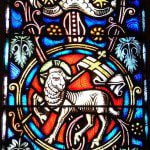Lectionary Reflections
Isaiah 43:1-7
January 13, 2013
Nearly ten years ago my wife had a very serious back surgery. She had been in pain for many years, her long and difficult and beautiful life as a dancer having come home to roost in the L 4/5 vertebrae of her spinal column. She had tried to avoid the surgery for as long as possible, but when she one time found herself incapable of getting off an airplane without the aid of a wheelchair—on the way to another dance workshop, of course—she decided the jig was up, and the surgeon's knife was the only way to live out her life with far less pain. So, she had the surgery. It was worse than she and I had ever imagined.
She found herself in bed for nearly three months, unable to walk on her own, unable to leave the house. Three more months of difficult and slow movement with the aid of a walker, followed by countless months of physical therapy, were the result of the fusion procedure in addition to the thorough cleansing of the spinal column and the necessary rearrangement of some of the body's most important nerves.
Diana is an ordained United Methodist pastor and a great lover of the scripture. As she lay in our bed, often in more pain than she had had before the surgery, she called often for me to read scripture to her. Today's passage from II-Isaiah was the one she asked for most often. In fact, she soon had it memorized and would speak it aloud with me as I read it to her. I cannot describe the great and soothing comfort these words provided for her, and for me, as we walked our journey toward healing and a reduction of pain. Whenever I read these ancient words again, I can still see my wife's face as she received the conviction of God's healing presence through the grand Isaianic poetry of some 2600 years ago.
Surely, the deep pain of the exiled Israelites was not unlike my wife's physical pain. After all, they had lost everything that they had been promised that they would always have. The land given to Abram by YHWH in the hoary past was now controlled by Babylonian pagans. The great temple of Jerusalem, which had stood for 350 years as the physical and spiritual center of their religious lives, was a smoking ruin. And because the temple was no more, the regular priestly practice of sacrifice and offering had been disrupted, seemingly forever. And the king directly descended from David, fulfilling the words of 2 Samuel 7, had been blinded and rendered childless by the cruel Nebuchadnezzar. All was gone, and with all those monstrous realities staring them in the face, one can be sure that many of the exiles lost faith in the God who had made those promises; perhaps that God did not finally exist after all.
And into that cauldron of pain and confusion came the unknown poet we call II-Isaiah. We know precisely nothing about him, least of all his name. What we do know are his words, words that have brought hope to the hopeless and comfort to the afflicted for twenty-six centuries.
"Now, thus says YHWH." In the heart of the pagan city of Babylon with its giant tower of Marduk, Entemenanki, and its wonderful palace of the king, adorned with a second story garden of parks and trees, Isaiah announces that YHWH lives yet and that Marduk and Nebuchadnezzar do not in fact rule the world, as much as it appears that they do. And just who is this YHWH? This God is "the One who created you, Jacob, the One who shaped you, Israel" (43:1a).
The verbs here are telling. The first, "created" (bara' in Hebrew) is the first verb found in the Hebrew Bible. Genesis 1:1 proclaims that YHWH is first revealed as "creator" of sky and earth. But the second verb, "shaped" (yatser) is found in the second creation story of Genesis 2, where YHWH is described as an artist, using a moistened lump of clay to form/shape each human being and animal. YHWH creates and YHWH shapes the creation with skill and finesse and beauty. This YHWH is no distant and disconnected creator; this YHWH is with us, intimately shaping us and sustaining us.
Just how do these claims sound in the ears of exiles, hopeless and far from home? How do they sound to anyone in pain and distress? "Do not be afraid, because I have vindicated you! I have called your name; you are mine" (43:1b)! The verb I have translated "vindicate" is a famous and controversial one. It occurs most prominently at Job 19:25, where the sufferer, rejected by his so-called friends and seemingly attacked by the God he thought was his friend, shouts "I know that my vindicator is alive," using this same word, go'el. Of course, the traditional translation is "redeemer," and early Christians applied the word to the one they called their redeemer, Jesus of Nazareth. But surely what Isaiah has in mind for his fellow exiles is the certainty that YHWH has not forgotten God's people in Babylon. God has vindicated them, justified them, supported them, upheld them. Just as Isaiah began his prophecy with the unforgettable word of "comfort" for the exiles (40:1), Isaiah here again says to the sufferers that they are not alone; YHWH is still here with them in their suffering.





